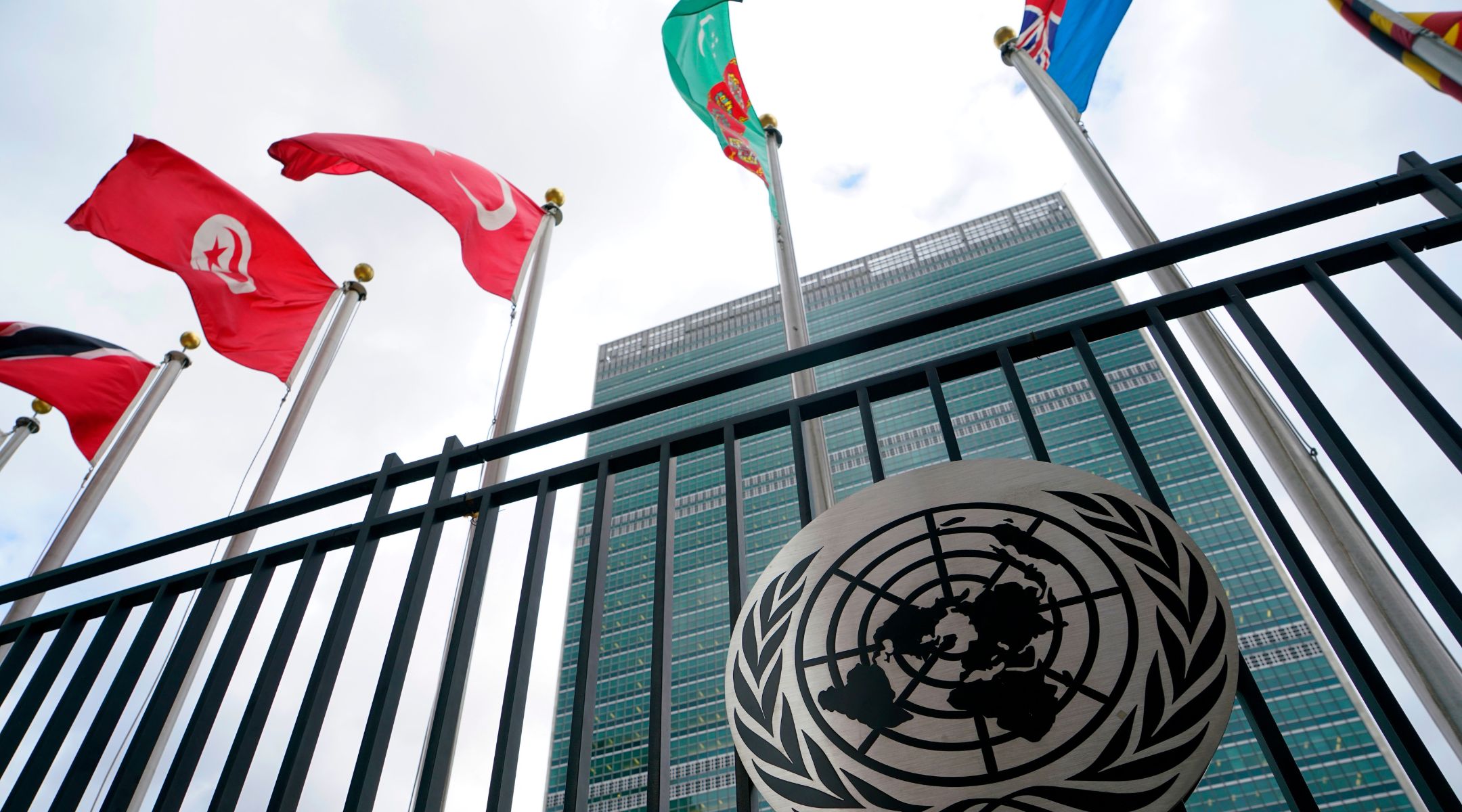When democratic leaders endorse a Palestinian state with Hamas still holding hostages and power in Gaza — as many are this week at the United Nations — I wince.
That’s not Jewish paranoia or un-Zionist pessimism – it’s healthy realism and self-preservation. Read through the French statement’s diplomatic verbiage. It confirms that this push advances the campaign to bully Israel to do Europe’s bidding: “This strong act of diplomacy is also a contribution to the momentum that is building around the reformulation of a political horizon, one that is necessary in order to make the ceasefire … a concrete and permanent reality.” Hammer, meet nail.
Some Zionists, desperate for anything to restore the prospect of peace to an Israel at war, have endorsed the moves. Their craving for a sign of hope reflects the admirable Zionist instincts to be tree-planters, not just firefighters.
But they are misguided – especially less than two years after Hamas’s Oct. 7 bloodbath, with Hamas still holding 48 hostages. Predictably, Hamas has rejoiced that calls for a Palestinian state “represent political and moral pressure” on Israel. Clearly, Hamas and many Palestinians recognize these moves as blows to Israel, rewards for their Oct. 7 barbarism, and disincentives to release the hostages and surrender, which would end Gazans’ misery.
That’s why, when Zionists endorse Palestinian statehood in the name of Zionism — now, in wartime — I cringe. Zionists, who by definition believe in Jewish peoplehood, Jewish statehood, and democracy, should oppose a movement that keeps fusing anti-Zionism with traditional antisemitism, and is dictatorial, terroristic and annihilationist in its intentions toward Israel, the Jewish people and anyone else who gets in their way or cavorts with Jews.
How frequently must Palestinians target Jews and Jewish institutions before we get the message? How often must pro-Palestinians turn their wrath on Israel into anti-Jewish fury, using antisemitic stereotypes of Jews as all-powerful, vengeful, and manipulative — before we recognize the irrational Jew-hatred that has long doomed any peace process? How loudly do they have to explain their BDS anti-normalization strategy — which freezes out peaceniks, too — before we take their words seriously? And how many times must they, their covenants, sermons, speeches and violence, reject compromise before we realize that their calls for a “two-state solution” really envision a no-democratic-Jewish-state solution?
Admittedly, Zionists aren’t perfect — and the horrific rhetoric of some prominent Israeli government officials also makes me wince and cringe. But, overall, Zionist history is filled with noble attempts to solve the Arab-Israel conflicts. Many worked, reducing the unyielding, monolithic conflict, thanks to peace treaties with Egypt, Jordan, the UAE, Morocco, Sudan, we never dared imagine during the Arabs’ annihilationist 1973 War.
By contrast, the Palestinian movement’s history is pockmarked with vile rhetoric and rejectionism. In 1947 Arabs violently said “no” to a Jewish state — ultimately launching a war with six Arab armies in May 1948. In 1967, the Arab League offered Three Nos of Khartoum: No peace with Israel, No negotiations with Israel, No recognition of Israel. In the 1990s, the Oslo Peace Process ultimately triggered the terrorist murders of 1,000 innocent Israelis, and as Palestinian terrorism spread in 2001, President Bill Clinton yelled at the PLO’s Yasser Arafat: “You made me a failure” by resisting compromise. The 2005 Gaza disengagement — from every last inch of sand — spawned Hamas-istan, over 20,000 rocket attacks and Oct. 7. And in 2008, the so-called “moderate” Palestinian Authority President Mahmoud Abbas spurned Ehud Olmert’s peace plan. Asked in 2015 “What did you propose in return,” Abbas admitted: “I did not agree. I rejected it out of hand.”
History can be harsh but illuminating. That Zionists made mistakes, yearning for peace, is excusable. But refusing to learn from those mistakes — again and again — is not.
Admittedly, right now, we’re stuck. Israel’s top priority is winning this seven-front war launched by Hamas, Hezbollah, the Houthis, Iran’s regime, Palestinian terrorists, Iraqi militias, and Syrian jihadists with renewed vigor since Oct. 7. History will not judge kindly anything — including calls for Palestinian statehood – that divides us, weakens us, or undermines the eighth front — the public relations battle that Iranian, Qatari and Turkish-funded haters have orchestrated against us.
Still, while fighting and winning in the moment, let’s start envisioning the day after. Just as it’s painful to hear others negate Jewish nationalism, because they decided “Jews are not a nation, only a religious community” or the “Israelis are settler-colonialists,” I don’t negate Palestinian nationalism. It’s as delusional to claim Palestinians don’t have a sense of nationhood as it is to claim that mainstream Palestinian nationalism accepts Jewish nationhood.
With that in mind — and knowing that most couldn’t conceive of peace with bloodthirsty enemies like the Egyptians and Jordanians 50 years ago — history sometimes surprises us. So let’s keep dreaming and building toward a better day, wisely, realistically, by incentivizing good behavior not Jihadi brutality.
That’s why Zionists especially should help the world retire the empty, failed call of “Two States for Two Peoples.” Instead, let’s endorse “two democracies for two peoples,” sincerely, not performatively.
That vision makes three bold moves. First, it shifts from implicitly, futilely, unfairly, one-sidedly, asking “how much of Israel’s small sliver of space will it carve out to satisfy Palestinians’ ever-expanding demands,” to asking “how much of the Palestinian national movement is prepared to reform and take responsibility?”
Second, while imagining a better day, it offers a more realistic path forward. Only by exorcising its overlapping anti-Zionist, anti-Jewish, anti-Western, and anti-democratic pathologies will the Palestinian national movement ever serve its own people, let alone live side by side with ours.
And third, it invites the international community to commit to democracy-building, not Israel-bashing.
Israel, too, has a role to play here, by doing whatever it can to improve Palestinian lives, start working with Palestinians who are nurturing civil society, and make peace with more and more Arab neighbors. Cries of hope and dreams of genuine peace must start drowning out extremists’ rants representing a hardcore Zionist fringe. And if we treat this as the Arab-Israel conflicts — with an “s” — we see some have been solved, and others are waiting to be.
JTA has documented Jewish history in real-time for over a century. Keep our journalism strong by joining us in supporting independent, award-winning reporting.






